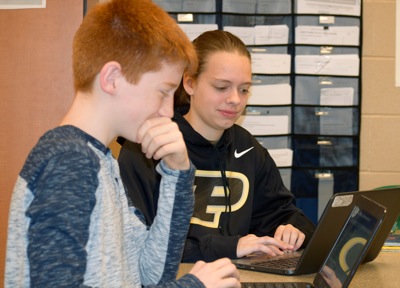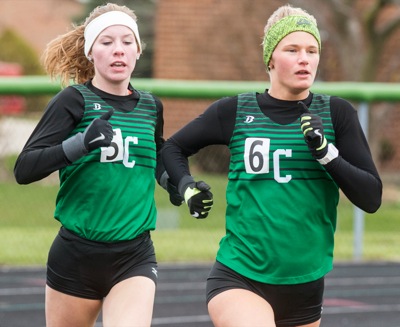Saturday, April 7th, 2018
Students crack the code
Parkway offers unique program
By Tom Stankard

Photo by Tom Stankard/The Daily Standard
Parkway seventh-grader Colin Fokine and eighth-grader Makenzie Stephenson work earlier this week on games they have been programming.
ROCKFORD - Students learning to write computer code today will become society's future innovators, Parkway Middle School eighth-grade teacher Ben Neff said.
Middle school students Makenzie Stephenson and Colin Fokine appreciate the benefits of this skill.
As technology continues to develop, Fokine said programmers will "be a massive help to the future of our country and the human race."
District officials started teaching coding two years ago as part of the science, technology, engineering, arts and math program.
"We realize that's kind of the future, and we're trying to do what we can to get our kids prepared and introduced to things," middle school principal Brian Woods said.
Coding has already advanced beyond what Neff learned in college, so he has taken a back seat and let students take off on their own.
The self-guided coursework takes student from "just being consumers of information" to being creators, Neff said.
"It's worthwhile, and the kids seem to really like it," Woods said.
Coding helps students develop critical-thinking and problem-solving skills as well as creativity and determination, he said. Using laptops and tablets, students begin coding using Google's free CS First software. They can create projects about themes such as sports, art and fashion.
"It's pretty amazing what they can do once they get the hang of it," Neff said.
Once they grasp the basics, students transition to using the free Scratch software developed by Massachusetts Institute of Technology. It allows them to program their own interactive stories, games and animation.
Coding has come naturally to Stephenson and Fokine.
"I like it because I can understand it," Stephenson said. "It's like reading a book for me most of the time."
Both have enjoyed designing their own games. Stephenson designed a variation of Pong, and Fokine has created two shooting games.
"It's fun to see and play what you make," Fokine said.
Stephenson said she gets frustrated when facing a problem she can't solve. However, she enjoys learning something new and actually prefers more complicated problems.
"The more complicated they are, the better. The harder they are to code, the better for me. I like the challenge," she said.
In the future, 75 percent of jobs will be STEAM-related, and coding is becoming the "backbone of many fields," Hemm added.
"In this century, if you don't know how to code, it's like not being able to read," he said. "Computer science is changing everything."
When she grows up, Stephenson said she wants to be either an app developer or a professional photographer. She has already combined both careers into one by designing a camera application.
Fokine hopes to become either an architect or an engineer one day.
"Ever since I was a young age, I've been into creating my own buildings and things," he said. "I want to design my own skyscraper one day."
Coding can enhance both career paths, they said.
"Coding lets me create my own world," Fokine said. "I can create whatever I want, like a world where gravity doesn't exist and everyone floats around everywhere."
But a computer is only as smart as the person who's programming it, Stephenson pointed out.
Fokine concurred and said most Americans' coding skills are limited at best.
"We don't have the skills as a country to fill programming positions," he said.

